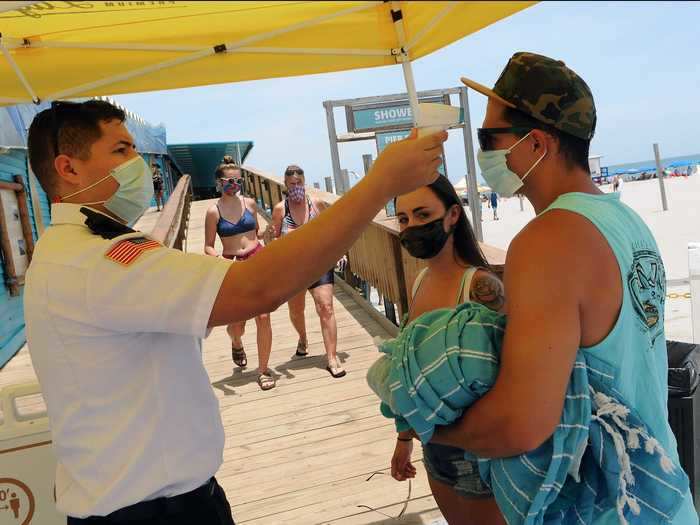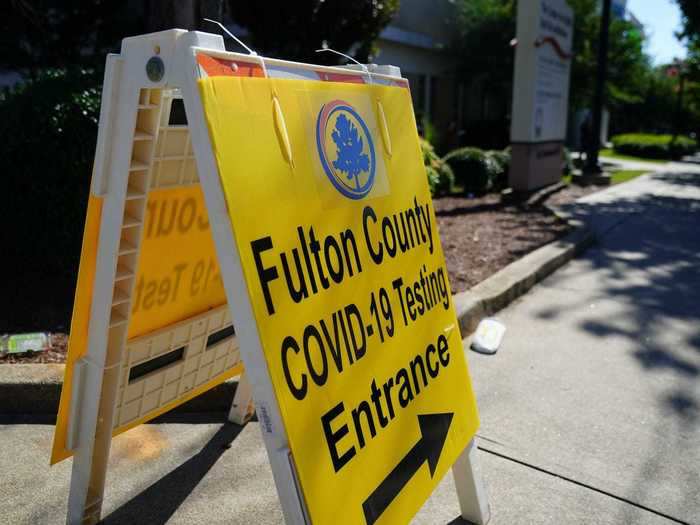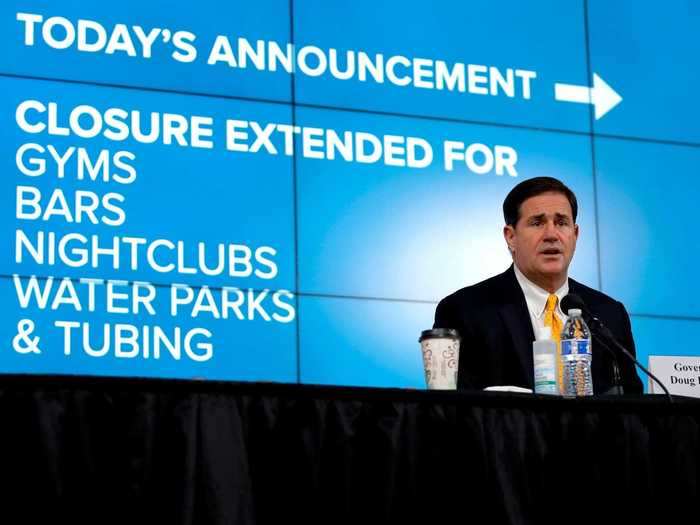People are seen walking on Ocean Drive in the entertainment district of Miami Beach on July 20, 2020 in Miami Beach, Florida.Johnny Louis/Getty Images
- LinkedIn has been surveying about 5,000 people every two weeks about their confidence in their finances and employment amid the pandemic.
- According to figures from the social network, monthly workforce confidence and over-the-month changes vary by state and may be influenced by different factors, such as the success of reopening plans within the state.
- Business Insider decided to look at three states that were either at or above the average confidence score, despite also having the most coronavirus cases per 1 million residents in July among the 24 states with available LinkedIn data.
Although coronavirus cases are on the rise in some parts of the country, such as in California and Florida, and millions of Americans are unemployed and filing for unemployment claims, it seems that many people are optimistic about the future of their career and their finances.
LinkedIn has been running a poll during the pandemic surveying about 5,000 people from the US through email every two weeks about their confidence in their "job security, financial well-being and career outlook." Using these questions, they have created a "Workforce Confidence Index" since April.
Overall US confidence is at a score of 31 on a scale of -100 to 100. LinkedIn's article on the May and June indices emphasized the importance of worker and consumer confidence to the broader economy. "When confidence is rising, consumers step up spending for everything from expensive weddings to new homes and cars. Meanwhile, businesses are eager to hire....When confidence weakens, everything goes into reverse, creating hard-to-overcome recessionary pressures," LinkedIn wrote in last month's report.
The following scatter plot shows July's coronavirus cases per 1 million residents and workforce confidence for the 24 states that LinkedIn has sufficient data for.
The three states with the highest per-capita number of COVID-19 cases between July 1 and July 29 among the 24 states LinkedIn looked at — Florida, Arizona, and Georgia — also had average to above-average confidence rankings, and are highlighted in orange on the chart above. LinkedIn's data team told Business Insider there are many factors that could influence the relationship between the number of coronavirus cases and workers' confidence, such as how long states spent in lockdown and political leanings.
We decided to take a closer look at the workforce confidence of the three states with the highest number of per-capita coronavirus cases:
Florida: Confidence in Florida decreased from 37 in June to 34 in July after cases climbed from over 96,000 in June to almost 299,000 cases in July.
People in Cocoa Beach, Florida, get their temperature checked on July 4, 2020.
Paul Hennessy/NurPhoto via Getty Images
In their analysis of their May and June indices, the LinkedIn team predicted a July drop in confidence as Florida considered reversing its reopening plans. The new report showed that confidence among respondents did drop in July, but only by three points and still above the average among the 24 states.
Although workers seem to be confident in their job security and finances, unemployment in Florida is relatively high. The state's preliminary unemployment rate in June was 10.4%, according to the US Bureau of Labor Statistics, putting Florida within the bottom half of states based on unemployment figures.
The recent drop in confidence may also be due to the number of job openings in the state. Opportunity Insights, a Harvard University-based institute that conducts research on the state of the economy for the purpose of policy changes, has been looking at the percent change in job openings during the pandemic relative to the number of postings from the month of January. In Florida, total job openings as of June 26 were 13.7% higher than in January. However, by the end of July, total job openings were 22.3% lower than that of January.
Business Insider previously reported that several Florida businesses and destinations closed again before the July 4th weekend, including bars and Miami-Dade county's beach. The state saw a spike in cases after the state reopened more businesses, like movie theaters, during phase two of the state's reopening plan in June.
Georgia: Confidence in Georgia increased from 30 in June to 37 in July, even with cases climbing from over 34,000 in June to around 97,000 in July.
A sign is seen at a free COVID-19 walk-up testing site on July 11, 2020 in Atlanta, Georgia.
Elijah Nouvelage/Getty Images
LinkedIn noted in last month's report that states like Georgia that opened quickly saw a drop in confidence. However, July's figures show confidence has risen slightly in the state.
After being one of the three states that had the largest drop in workers' confidence from May to June, Georgia had the third-largest increase in confidence in July. It also had one of the highest monthly scores in July.
Workers may be confident in their finances and job security because of the state's low unemployment rate relative to the rest of the US. According to BLS preliminary data, Georgia's unemployment rate was tied for the 12th-lowest rate in June, at 7.6%.
Atlanta rolled back its reopening to Phase 1 on July 10 after an increase in cases. This phase encourages residents to only leave their homes if it is essential and to wear face masks. This phase also means non-essential facilities are closed and restaurants can only operate through take out and curbside pickup.
Atlanta Mayor Keisha Bottoms said that the state "reopened in a reckless manner," according to The Atlanta Journal-Constitution news. However, state Gov. Brian Kemp tweeted that Bottoms' roll back plan is "merely guidance" and is "legally unenforceable."
Arizona: Confidence in Arizona decreased from 38 in June to 31 in July after cases rose from over 59,000 in June to around around 89,000 in July.
Arizona Republican Gov. Doug Ducey gives the latest Arizona coronavirus update during a news conference on Thursday, July 23, 2020, in Phoenix.
Matt York, Pool/AP
Confidence may have run too high in Arizona after the state reopened back in the middle of May. After a climb in confidence from May to June according to LinkedIn's survey, workers' optimism dropped again this past month.
Arizona is reversing some of its reopening, according to The New York Times' US reopening tracker. Business Insider previously reported that Arizona closed businesses like bars, gyms, and movie theaters before the July 4th holiday weekend. An executive order on July 23 ordered these businesses to remain closed, but plans will be reviewed every two weeks after July 27 to see what can be reopened. Per reporting by the Phoenix Business Journal, state Gov. Doug Ducey's original order of the closure of businesses, like bars and gyms, on June 29 was planned to end on July 27.
The state unemployment rate was one of the highest rates in the US at 10.0%.
According to job opening tracking data from Opportunity Insights, job openings in Arizona have been down compared to the start of the year for the majority of the pandemic, except for one week in mid-June. However, job openings declined by 25.6% as of the week ending July 24 relative to the start of the year.



